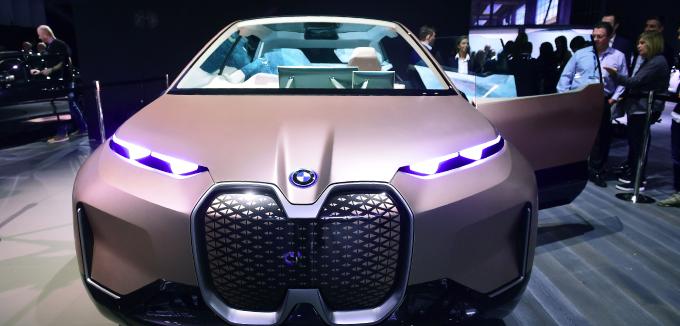AFP
BMW iNext. As a concept car, the electric car was presented in November 2018 in Los Angeles. 2021 is the iNext, which can drive highly automated, roll in Dingolfing from the tape
The car maker launches a gear in the electrification of its vehicles in view of the diesel crisis and impending CO2 penalties. As early as 2023 – two years earlier than previously planned – the Munich-based company wants 25 vehicles electric drive to offer. More than half of it will be purely battery-powered, the group announced on Tuesday.
The sale of pure Stromern and those, in addition to a combustor also have an electric drive on board, should increase by 2025 annually by more than 30 percent, announced CEO Harald Krüger. As early as 2021, BMW wanted more than twice as many electrified vehicles sell as 2019.
In two years, BMW wants to have a total of five fully electric vehicles at the start: In addition to the already built since 2013 in Leipzig i3 starts this year in Oxford, the production of the Mini with pure power drive. In 2020, the electric SUV iX3 will follow in Shenyang, China. The year after comes the much anticipated iNext, which can also drive highly automated and roll off the line in Dingolfing, as well as the BMW i4 from the main plant in Munich.
BMW continues to rely on plug-in hybrids
Krüger made it clear that BMW continues to rely on plug-in hybrids to reduce CO2 emissions. Such cars, the batteries are charged at the outlet, should be from 2020 as standard equipped with the “eDrive Zones”.
This means that if cities set up environmental zones for emission-free driving only, the vehicles recognize this thanks to geo-fencing technology and automatically switch to the purely electric drive. With this strategy, the potential for plug-in hybrids should be significantly increased, BMW said.
So far, Bayern have ten electrified models of the brands BMW and Mini on offer, most of them are hybrid vehicles. By 2021 at the latest, when the next generation of battery cells will allow ranges of up to 700 kilometers, the number of electric models will increase rapidly.
The big manufacturers – especially Volkswagen – want to ramp up the production of electricity in the next few years as quickly as possible in order to meet the stricter climate regulations in Europe. Otherwise threaten 2021 sensitive penalties.
According to calculations of the consulting firm AlixPartners, the Wolfsburg have to expect the highest penalties, followed by Fiat Chrysler and the Opel-dam PSA. BMW ranks in the estimates rather in the midfield. Toyota and Volvo, on the other hand, are fine because they even overfill their weighted climate targets.
rei / Reuters

